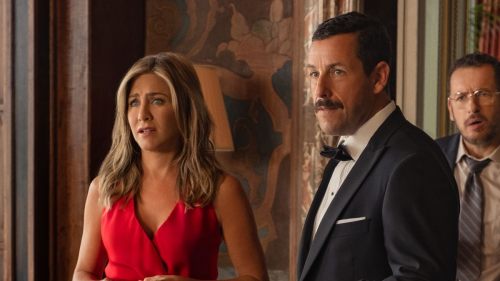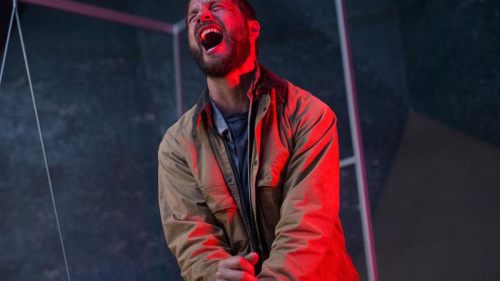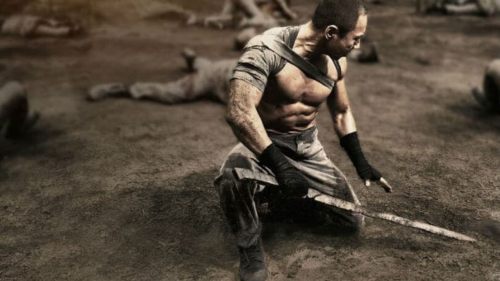THRILLER Review: Too late To Apologize
Dallas Jackson’s directorial debut supplants the urban horror popularized by John Carpenter’s Halloween into a contemporary inner-city Los Angeles setting, and attempts to address the stressors of low-income environments as they pertain to the high schoolers living there. But within the hour and a half of this ambitious thriller, the urban problems monologued by the movie’s young cast doesn’t thread in any meaningful way, and the movie lacks a solid connection between the social concerns of its characters, and the vengeful murders of its stalking villain.
Thriller presents itself as a bullying revenge tale. A group of middle-schoolers in Compton pull a prank on Chauncey (Jason Woods), a sweet but awkward kid with a stutter who’s lured into an old abandoned house by his crush, Lisa. The mask-wearing kids haunt Chauncey around the house until he reflexively pushes one of them off the railing, killing her. The shocked kids all agree to blame Chauncey alone for the young girl’s death, and Chauncey is shipped off to juvenile detention labeled a bully and a killer, his anger and institutional imprisonment depicted by a series of stylized graphic sketches.
Four years later, Chauncey returns to Compton the day before that same crew of kids are prepping for their Homecoming Dance (get it?). Now transitioning through their adolescence, each blossoming teen is supposed to shake-up the typical teen horror archetypes with urban concerns.
Lisa (Jessica Allain), the smart but quiet girl, feels boxed-in by her neighborhood and is worried about not being able to afford any of the colleges she’s been accepted to. Kim (Pepi Sonuga), the pretty and promiscuous girl whose sister was accidentally killed by Chauncey, has a secret but unimpactful dissociative identity disorder that manifests as the personality of that same sister. Ty (Mitchell Edwards), the school’s star quarterback for whom football is a ticket out, is harassed by his ex-girlfriend Gina (Paige Hurd), the school’s requisite mean girl. Andre (Tequan Richmond) is the kid with a chip on his shoulder who thinks he has to act tough to keep from being taken advantage of in the inner-city. Since Chauncey (Chauncey Page) becomes a revenge-seeker, Derrick (Luke Teenie) replaces the kind but quiet role with a crush on the pretty girl. And finally, Tiffany (Chelsea Rendon) becomes increasingly flirtatious with party-boy Ronny (Maestro Harrell) despite the protests of her current boyfriend Eddie (Michael Ocampo).
There’s also a slew of adults who had the potential to be more fun than they actually are. Principal Clarence Hurd is a tough-guy, sadistic principal played by the Wutang Clan’s RZA. Ms. Cruz (Valerie Ortiz) is an attractive teacher concerned with Derrick’s drop in grades, who also might be sleeping with seniors. Unique (Chauncey Jenkins) is a newly popular R&B singer who takes advantage of High Schooler Tiffany’s attraction to him to get laid. And Detective Raymond Johnson, a Black police officer played by Forrest Gump’s Mykelti Wilson, investigates Chauncey as the prime suspect for the string of recent murders, pretty much profiling him the minute he gets back home. And Chauncey himself, near-mute and hulking after coming home, has an alcoholic, neglectful mother (Robyn Yvett) who, at one point, he chokes out of anger. The effects of the abuse that these adults leverage against teenagers have a minor presence that, had there been more follow-through, might have made a more interesting movie.
It’s a shame that there are so many unfocused themes, because the main cast does a decent job reflecting that kind of hang-out antagonism typical of high schoolers, and the movie is at its best when the teens are catching up, working together, flirting, and fighting each other. These characters honestly wouldn’t be out of place in a high school drama, and maybe if Thriller had leaned more into its pulpier aspects, it wouldn’t be so weighed down by the imbalanced social concerns.
As the contemporary Film and Television landscape becomes steadily more diverse, the question is posed of how to balance the social problems that are part of the reality of people of color with the facets of genre films that filmmakers from Black and Latino communities grew up watching and loving. How do you capture what works to make genre so enjoyable to watch, with characters whose lives reflect more diverse backgrounds?
Steve McQueen’s Widows navigated a wide web of intersecting themes of race, gender and class within the heist genre. The utilization of the genre made sense because it allowed McQueen to center the dramatized frustration of his female characters’ relative social and fiscal powerlessness via the heist as a reclaiming of resources. Meanwhile, Jordan Peele’s impressive back-to-back Horror showcase of Get Out and Us binds his social commentary to antagonistic characters that his main characters learn about, and engage with directly. And as the layers of Peele’s villains are peeled back with the central characters’ investigations, complex themes are revealed as well.
By contrast, I don’t think the legacy of the mysterious serial killers of ‘80s slashers lend themselves well to interlinking social issues in the inner city. Part of what made characters like Michael Myers and Freddy Krueger so chillingly effective was their encapsulation of the random violence that could take unassuming and secure white American communities by surprise, with little-to-no explanation or understanding. That mysteriousness doesn’t extend as well to Thriller’s clearly vengeful, motivated murderer, nor the Compton kids who all but ignore Chauncey’s return. That they do this to their consequential deaths is, I think, director Dallas Jackson’s attempt to emphasize a hubris of sorts related to their collective disregard of the impact of their collective bullying on the kind, unassuming Chauncey, and the collateral death of the young girl. But between the incomplete feeling side plots of the adults’ abuse/neglect, and the institutional pressures the young cast attempts to give voice to, the significance of bullying as a theme, and the villain’s signification of that theme, becomes lost.



